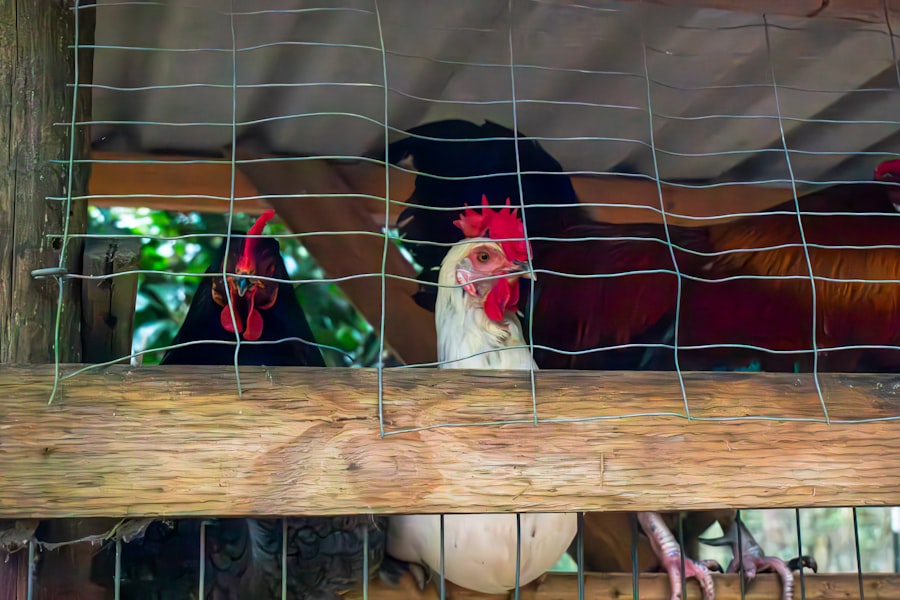Free range chickens exhibit natural behaviors that are important to consider when managing them in a garden setting. These birds are instinctively curious and exploratory, with a strong drive to forage for food by scratching and pecking at the ground. They search for insects, seeds, and other edible items as part of their daily routine.
Dust bathing is another essential behavior for chickens. This involves digging shallow depressions in the ground and rolling in the dirt to clean their feathers and remove parasites. Chickens are also highly social animals that thrive in flocks, often following the lead of more dominant individuals within their group.
Understanding these behaviors is crucial for effectively managing free range chickens in gardens. By recognizing their natural instincts, gardeners can develop strategies to prevent damage to plants and landscaping while still allowing chickens to engage in their natural behaviors in a controlled manner. Free range chickens are capable of flying short distances and are adept at finding small openings in fences or barriers.
This means that traditional fencing may not always be sufficient to keep chickens out of certain areas. Gardeners must take these factors into account when designing their chicken management strategies. By comprehensively understanding chicken behavior, gardeners can create plans that accommodate the birds’ natural tendencies and instincts.
This approach can lead to a more harmonious coexistence between chickens and the garden environment, balancing the needs of both the birds and the plants.
Table of Contents
- 1 Creating physical barriers to keep chickens out of the garden
- 2 Using natural deterrents to discourage chickens from entering the garden
- 3 Implementing humane methods to keep chickens away from garden plants
- 4 Providing alternative areas for chickens to forage and explore
- 5 Regularly monitoring and maintaining the garden to deter chicken activity
- 6 Consulting with local experts for additional advice on managing free range chickens
- 7 FAQs
- 7.1 What are free range chickens?
- 7.2 Why do free range chickens go into gardens?
- 7.3 How can I keep free range chickens out of my garden?
- 7.4 What types of fencing can be used to keep chickens out of the garden?
- 7.5 What are some physical barriers that can be used to keep chickens out of the garden?
- 7.6 Are there any natural repellents that can be used to keep chickens out of the garden?
- 7.7 How can I provide alternative foraging areas for free range chickens?
Key Takeaways
- Free range chickens exhibit natural foraging behavior and may enter gardens in search of food and insects.
- Physical barriers such as fences, netting, and raised beds can effectively keep chickens out of the garden area.
- Natural deterrents such as citrus peels, coffee grounds, and predator decoys can discourage chickens from entering the garden.
- Humane methods such as using noise, water, or motion-activated devices can be implemented to keep chickens away from garden plants.
- Providing alternative foraging areas with grass, bugs, and scratching opportunities can redirect chickens away from the garden.
- Regular monitoring and maintenance of the garden, including removing fallen fruits and covering freshly tilled soil, can help deter chicken activity.
- Consulting with local agricultural extension offices or poultry experts can provide additional advice and resources for managing free range chickens.
Creating physical barriers to keep chickens out of the garden
Designing Effective Barriers
This can be achieved through the use of fencing, netting, or other structures that are specifically designed to deter chickens. When implementing physical barriers, it’s important to consider the height and strength of the materials used, as well as any potential entry points that chickens may exploit.
Types of Barriers
For example, using chicken wire or hardware cloth to create a barrier around the perimeter of the garden can help prevent chickens from gaining access to sensitive plants and landscaping. Additionally, installing a roof or netting over the garden area can further deter chickens from flying in and causing damage.
Additional Deterrents
In addition to traditional fencing and netting, gardeners can also use other physical deterrents such as scarecrows, motion-activated sprinklers, or even reflective materials that can startle and discourage chickens from entering certain areas. By creating physical barriers that are specifically tailored to the behavior and capabilities of free-range chickens, gardeners can effectively protect their garden while still allowing the birds to roam and forage in designated areas.
Using natural deterrents to discourage chickens from entering the garden

In addition to physical barriers, natural deterrents can also be used to discourage free range chickens from entering the garden. These deterrents take advantage of the birds’ natural aversions and instincts, ultimately leading them to avoid certain areas without causing harm or distress. One common natural deterrent is the use of strong-smelling herbs and plants that chickens find unappealing.
For example, planting rosemary, lavender, or mint around the perimeter of the garden can help deter chickens from entering, as they tend to avoid areas with strong scents. Additionally, spreading citrus peels or using citrus-based sprays can also discourage chickens from foraging in specific areas. Another natural deterrent is the use of predator decoys or sound devices that mimic the presence of potential threats to chickens.
For example, placing fake owls or hawks in the garden can create the illusion of predators nearby, causing chickens to steer clear of the area. Similarly, using sound devices that emit noises such as barking dogs or predatory bird calls can also deter chickens from entering the garden. By utilizing natural deterrents that take advantage of chickens’ natural aversions and instincts, gardeners can effectively discourage the birds from causing damage to plants and landscaping without resorting to harmful or inhumane methods.
Implementing humane methods to keep chickens away from garden plants
When it comes to keeping free range chickens away from garden plants, it’s important to prioritize humane methods that do not cause harm or distress to the birds. One effective approach is to use physical barriers such as fencing or netting to protect sensitive plants while still allowing chickens to roam and forage in designated areas. Another humane method is the use of repellent sprays or powders that are specifically designed to deter chickens without causing harm.
These products often contain natural ingredients such as garlic, hot peppers, or bitter-tasting substances that are unappealing to chickens but are safe for use around plants and landscaping. Additionally, providing alternative foraging areas for chickens can help redirect their attention away from garden plants. This can be achieved by creating designated foraging zones with loose soil, sand, or mulch where chickens can scratch and peck to their heart’s content without causing damage to sensitive areas.
By implementing humane methods that prioritize the well-being of free range chickens while still protecting garden plants, gardeners can achieve a balanced approach that allows both the birds and the garden to thrive in harmony.
Providing alternative areas for chickens to forage and explore
In order to keep free range chickens away from garden plants, it’s important to provide alternative areas where they can forage and explore to satisfy their natural instincts. By creating designated foraging zones and enrichment opportunities, gardeners can redirect the birds’ attention away from sensitive plants and landscaping while still allowing them to exhibit their natural behaviors. One effective way to provide alternative foraging areas is to create designated chicken gardens or grazing paddocks where chickens can roam freely and forage for insects, seeds, and other food sources.
These areas can be planted with chicken-friendly vegetation such as clover, alfalfa, or sunflowers, providing a safe and enriching environment for the birds to explore. In addition to designated foraging zones, providing enrichment activities such as hanging treats or toys can help keep free range chickens engaged and occupied, reducing their likelihood of causing damage to garden plants out of boredom or curiosity. For example, hanging cabbage or lettuce heads from a string can provide a fun and nutritious activity for chickens while keeping them away from sensitive areas.
By providing alternative areas for free range chickens to forage and explore, gardeners can help satisfy the birds’ natural instincts while minimizing their impact on garden plants and landscaping.
Regularly monitoring and maintaining the garden to deter chicken activity

Identifying Problem Areas
One essential aspect of monitoring is keeping an eye out for signs of chicken activity, such as scratching, pecking, or dust bathing near sensitive areas. By regularly inspecting the garden for these behaviors, gardeners can identify problem areas and take proactive measures to deter chicken activity before it causes significant damage.
Maintaining a Chicken-Deterrent Environment
Maintaining a clean and tidy garden can also help deter free-range chickens from causing damage. Removing fallen fruits and vegetables, keeping compost bins covered, and promptly cleaning up any spilled birdseed or other food sources can help reduce the attractiveness of the garden to chickens.
Staying Ahead of Potential Issues
By regularly monitoring and maintaining the garden environment, gardeners can stay ahead of potential issues related to free-range chicken activity and implement proactive measures to deter the birds from causing damage.
Consulting with local experts for additional advice on managing free range chickens
For additional guidance on managing free range chickens in a garden setting, it can be beneficial to consult with local experts who have experience with poultry management and behavior. Local agricultural extension offices, poultry clubs, or experienced chicken keepers in the community can provide valuable insights and advice on effective strategies for deterring chickens from causing damage to garden plants. Local experts may be able to offer specific recommendations tailored to the unique challenges and opportunities presented by the local environment.
For example, they may have insights on plant species that are particularly attractive or unappealing to chickens, as well as recommendations for natural deterrents that are effective in the area. In addition to seeking advice from local experts, joining online forums or social media groups dedicated to poultry keeping can also provide valuable insights and support from a community of experienced chicken keepers. By tapping into local knowledge and expertise, gardeners can gain valuable insights on managing free range chickens in a way that protects their garden while still allowing the birds to thrive in a natural environment.
In conclusion, understanding the behavior of free range chickens is crucial when it comes to managing them in a garden setting. By creating physical barriers, using natural deterrents, implementing humane methods, providing alternative foraging areas, regularly monitoring and maintaining the garden, and consulting with local experts, gardeners can effectively deter free range chickens from causing damage while still allowing them to exhibit their natural behaviors in a controlled manner. With careful planning and proactive measures, it is possible to achieve a harmonious coexistence between free range chickens and the garden environment.
If you’re struggling to keep free range chickens out of your garden, you may want to consider building a large chicken coop to contain them. Poultry Wizard offers some great ideas for large chicken coops, including the Hannah Montana Chicken Coop and the Chicken Coop Trampoline. Check out their article on large chicken coop ideas for some inspiration on how to keep your chickens contained and out of your garden.
FAQs
What are free range chickens?
Free range chickens are poultry that are allowed to roam freely and forage for food, as opposed to being confined to a coop or small enclosure.
Why do free range chickens go into gardens?
Free range chickens may be attracted to gardens because they offer a variety of plants, insects, and other food sources for the chickens to forage.
How can I keep free range chickens out of my garden?
There are several methods to keep free range chickens out of your garden, including using fencing, creating physical barriers, using repellents, and providing alternative foraging areas.
What types of fencing can be used to keep chickens out of the garden?
Chicken wire, electric fencing, and netting are commonly used to keep free range chickens out of gardens. These types of fencing can be installed around the perimeter of the garden to prevent chickens from entering.
What are some physical barriers that can be used to keep chickens out of the garden?
Physical barriers such as low walls, raised beds, and cloches can be used to prevent free range chickens from accessing the garden and damaging plants.
Are there any natural repellents that can be used to keep chickens out of the garden?
Some natural repellents that may deter free range chickens from entering the garden include citrus peels, garlic, and hot pepper spray. These can be scattered around the garden to discourage chickens from foraging.
How can I provide alternative foraging areas for free range chickens?
Creating designated foraging areas with a variety of plants, insects, and other food sources can help redirect free range chickens away from the garden and provide them with an alternative space to forage.
Meet Walter, the feathered-friend fanatic of Florida! Nestled in the sunshine state, Walter struts through life with his feathered companions, clucking his way to happiness. With a coop that’s fancier than a five-star hotel, he’s the Don Juan of the chicken world. When he’s not teaching his hens to do the cha-cha, you’ll find him in a heated debate with his prized rooster, Sir Clucks-a-Lot. Walter’s poultry passion is no yolk; he’s the sunny-side-up guy you never knew you needed in your flock of friends!







